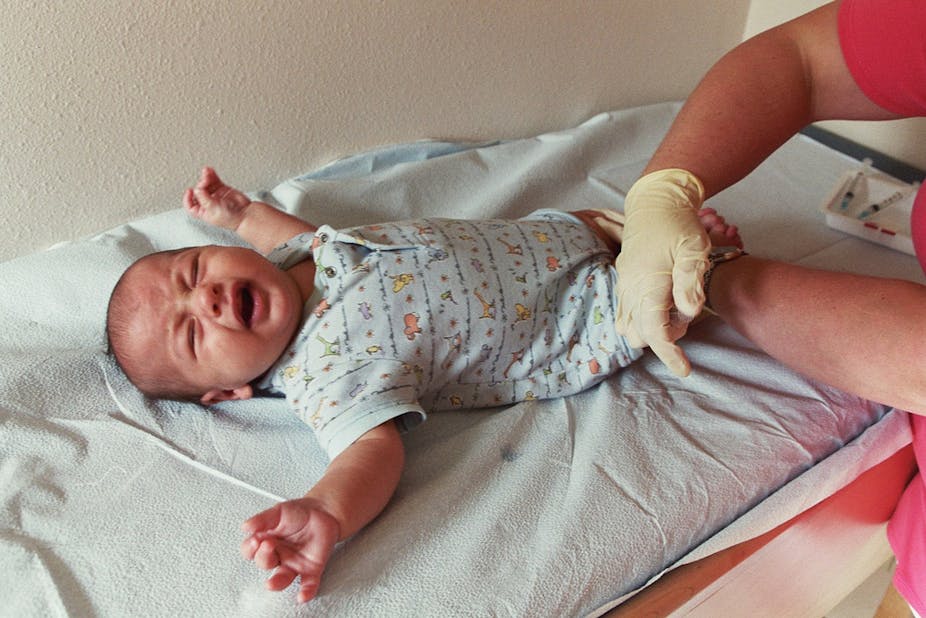Often cited as one of the most important medical breakthroughs in human history, immunisation has been a hallmark of public health interventions for more than 200 years. Globally, an estimated 2.5 million deaths are prevented annually because of vaccinations.
Since 2005, childhood immunisation rates in Australia have consistently been at around 92% for tetanus, diptheria and pertussis (whooping cough) and slightly higher for measles at 94%. Coverage is lowest in Western Australia, and has been lower than the national average since 2004.
As at September 2013, 90.7% of Western Australian children aged between 12 and 15 months, 91.1% aged between 24 and 27 months, and 90.3% aged between 60 and 63 months were fully immunised, making Western Australia the lowest nationally for the latter two, and second lowest after New South Wales in the 12- to 15-month age group.
Cluster of refusal
Much has been written about vaccine refusal and its implications for public health, both internationally and within Australia. Nationally, the rate of “vaccine refusers” (parents who actively decline vaccinations) is estimated to be up to 2%.
Significantly, “refusers” tend to cluster in certain regions, generating particular risks from insufficient herd immunity for people living there.
The greater Fremantle area in Western Australia is a one such area with lower than average coverage rates. Like the Northern Rivers region of New South Wales and the Sunshine Coast in Queensland, Fremantle and its surrounds are home to a large and vibrant alternative lifestyle community, some of whom delay, are selective about or avoid vaccines altogether.
Previous attention has been directed towards vaccine-refusing communities from doctors and governments, which is not surprising given that they bear responsibility for mopping up outbreaks of disease.
But vaccine refusal also commands broader attention, from the plight of an unvaccinated child to efforts to restrict resources to vaccine refusers.
The right approach
The wider community cares about immunisation precisely because decisions not to vaccinate can adversely affect others; a risk intensified in areas of low coverage. Now, for the first time in Australia, members and residents of “alternative” communities are themselves organising around low vaccination rates.
The “I Immunise” campaign, addressing Fremantle’s alternative lifestyle community, is the first of its kind in the country, and is being run by the nation’s first pro-immunisation, not-for-profit organisation, the Immunisation Alliance of Western Australia (Michael J Wise and Katie Attwell are members).
“I Immunise” does what other Australian campaigns have not: it leads with values rather than facts. Parents in alternative lifestyle communities are often university-educated and see themselves as living ethical lifestyles.
For those of us developing the campaign, a particular interest has been the perceived dissonance among people valuing choices that give back to the community (minimising waste and consumption, for example) and yet engaging in a choice that endangers their community.
Spreading organically
The decision not to vaccinate can be explained by many factors, from fear and misinformation through to an aversion to the Western medical model, or perhaps a desire to live a more “natural” lifestyle.
What’s more, repeated exposure to anti-vax sentiments within specific communities can make rejectionism appear to be the norm. This is particularly notable through the processes of organic induction into such communities: from home-birthing peers one can learn cloth-nappy use, which baby-wearing device is best and why vaccinations should be avoided.
Alternative communities can tend towards a culture of competitive “crunchiness”, with status acquired on the basis of choices about birthing, breastfeeding, food, and lifestyle.
In this setting, opinion leaders can dispense advice without critically examining the value and efficacy of vaccines. Their rejectionism feeds on existing critiques of other “mainstream” practices. And it contributes to a culture that appears seductively (from the inside) as the last bastion of critical thought beyond the mind-control of bourgeois consumerist society.
Is refusing ethical?
The “I Immunise” campaign does not seek to undermine this broad cultural perspective. Indeed, the intrinsic value of critical thought and questioning underscores the campaign’s own appeals to ethical decision making.
Nor does the campaign seek to depose or even engage directly with vax-refusing opinion leaders, since it’s recognised that such sentiment is difficult to dislodge. Rather, it seeks to carve out a space within the Greater Fremantle community – and particularly its more “alternative” quarters – in which a counter-narrative about immunisation can emerge.
It seeks to change the conversation to include vaccination in the suite of preventative health measures that health-conscious families use.
Vaccination can then be attributed to an ethical decision-making process conducted by critically-thinking parents concerned for their children’s health and community well-being. This will hopefully inform open conversation between “fence sitters” and health professionals.
Six campaign participants will feature in posters and billboards prominently displayed around Fremantle. The posters identify the subjects’ lifestyle practices alongside their support for immunisation. Longer testimonials on the campaign website explain the participants’ decisions in terms of values and methods for processing the information available on vaccines.
The campaign is expected to bring about gradual, organic shifts in the discourse around immunisation. Its authenticity is crucial to its success and, in this, the story of its genesis is important.
“I Immunise” comes from the community to which it is addressed. It derives from lived experience and from fears of diseases spreading in spaces ironically characterised as “safe” and “caring”.
Colleen Fisher and Katie Attwell contributed equally to this article.

